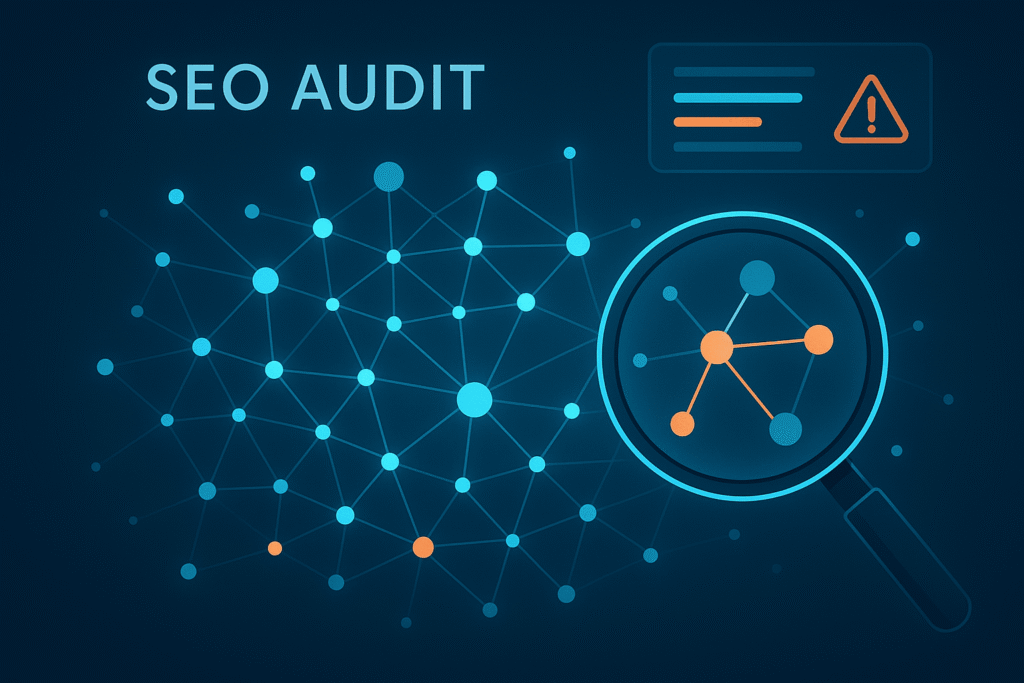Introduction: Why Rankings Slip Without Warning
If you’ve ever opened your analytics dashboard only to see your once-dominant pages sliding down the SERPs, you know the frustration. The usual checks—backlinks, site speed, penalties—don’t always reveal the issue. Often, the problem isn’t with your keywords or your links but with something deeper: how search engines interpret your site’s entities. Search engines are no longer keyword counters. They’re knowledge builders, linking concepts, people, places, and things into networks of meaning. If your content doesn’t fit neatly into that puzzle, it becomes harder for Google to connect the dots and reward you with visibility. That’s where an entity-focused audit framework changes the game.
Understanding Entities in SEO
Entities are the building blocks of meaning online. They’re the “things, not strings” that Google has been obsessed with since launching its Knowledge Graph. An entity can be:
- A person (e.g., Steve Jobs)
- A place (e.g., New York City)
- A product (e.g., iPhone 13)
- A concept (e.g., renewable energy)
When you create content, search engines don’t just want to see the keyword. They want to recognize which entity it connects to and how that entity fits within a larger ecosystem.
Entities vs. Keywords
The difference is subtle but critical. Keywords are surface-level—what users type. Entities are the meaning behind those queries. A search for “best Italian restaurants near me” isn’t just about words—it’s about connecting entities (restaurants, Italian cuisine, location) and providing structured answers.
If your content still leans heavily on keyword stuffing without building strong entity connections, you’re likely leaving rankings on the table.
Where Ranking Inefficiencies Come From
Ranking inefficiencies show up when your content exists but doesn’t perform to its potential. Think of it as a car with the engine running but the handbrake still on.
Signs You’re Facing Entity-Related Inefficiencies
- A slow, steady decline in rankings despite regular updates
- Competitors outranking you with thinner content
- SERP features (like snippets) showing unrelated connections to your brand
Why? Because Google can’t confidently place your content within its knowledge graph. It’s like your book being misfiled in the wrong section of a library.
The Entity-Focused Audit Framework
Step 1: Map Your Entities
Start by identifying the primary entities that define your business and content. If you’re a law firm, your primary entity might be “family law,” while secondary entities include “divorce mediation,” “child custody,” and “legal representation.”
Mapping these entities helps you spot gaps where your content fails to cover important connections.
Step 2: Build Depth Around Each Entity
It’s not enough to mention an entity—you need to give it context. A page about “organic skincare” should also address related entities like “natural ingredients,” “dermatologist-approved,” and “sustainable packaging.”
Search engines look for these bridges to evaluate authority. Without them, your entity appears shallow, and rankings suffer.
Step 3: Strengthen Internal and External Connections
Internal linking should reinforce entity relationships. For example, a page on “home workout equipment” should link to supporting pages about “yoga mats,” “dumbbells,” and “resistance bands.”
Externally, backlinks and structured citations validate your entity. Schema markup, mentions in trusted directories, and reviews all reinforce how search engines perceive your brand.
Tools That Help With Entity Audits
You don’t have to do this blindly. Tools like InLinks, WordLift, and Google’s Rich Results Test can show you where entity connections are weak or missing. Semantic analysis platforms reveal gaps in your content graph, while schema validators ensure your structured data sends the right signals.
Real-World Examples
Local Business
A Chicago bakery lost visibility not because of poor content but because its site didn’t connect “Chicago bakery” with supporting entities like “wedding cakes,” “neighborhood delivery,” or “artisan bread.” Competitors who did this pulled ahead.
E-commerce Store
An online furniture retailer ranked for “wooden chairs” but ignored related entities like “Scandinavian design” or “eco-friendly furniture.” Google saw the gap and rewarded competitors who made those connections.
Best Practices for Entity-Based Audits
- Keep your entity graph updated whenever you add new services, products, or content hubs.
- Balance machine readability with human storytelling—don’t let structured data overwhelm the narrative.
- Train writers to think beyond keywords. Encourage them to weave in entity-based context naturally.
Overcoming Challenges
Yes, shifting from keyword-centric SEO to entity-based SEO takes effort. Old-school habits like keyword density are hard to unlearn. Technical barriers, limited budgets, and lack of training can slow adoption. But even small steps—like mapping entities manually or adding contextual internal links—pay off over time.
The Future: Entity-First SEO
As AI-driven search and voice queries grow, entities are becoming the backbone of how information is retrieved. People aren’t asking for “keywords” anymore—they’re asking full questions, and Google answers by connecting entities. An entity-focused audit ensures your brand isn’t lost in translation.
Conclusion
Ranking inefficiencies often hide in the cracks between your content and Google’s understanding of it. By auditing with an entity-first mindset, you can repair those cracks and build a stronger foundation. Instead of patching holes with more keywords, you’ll create a resilient structure that stands tall in the SERPs.
If you’re serious about future-proofing your SEO strategy, consider running a tailored entity-focused audit with experts who specialize in this framework. Start today with SEO Sets and turn inefficiencies into growth opportunities.
FAQs
Q1: How often should I run an entity-focused audit?
At least twice a year or whenever you launch major new content hubs or services.
Q2: Do small websites benefit from entity auditing?
Yes, even a five-page site can improve visibility with stronger entity connections.
Q3: Is entity auditing more important than keyword research?
No—they complement each other. Keywords drive discovery, entities secure relevance.
Q4: What’s the biggest mistake brands make with entities?
Neglecting secondary entities, which often drive supporting traffic.
Q5: How do entities help with voice search?
Voice search thrives on context. Strong entity webs improve your chances of being the chosen answer.


